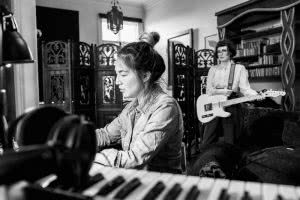APRA’s SongHub Sphere addresses gender inequality in the music biz

Gender inequality in songwriting and production remains a problem — but things are getting better. That was the message from the international guests taking part in SongHubs Sphere, the first New Zealand event staged by APRA AMCOS solely for women.
Curated by NZ singer-songwriter Chelsea Jade, the special SongHub — which wraps up today (Aug. 10) — has seen four international writers and producers team up with 15 New Zealand to work collaboratively on one new song each day.
As well as celebrating the 125th anniversary of New Zealand becoming the first country in the world to give women the right to vote, SongHub Sphere is also intended to address gender inequality within the music industry: just over 20 percent of APRA AMCOS’s members — songwriters and composers — identify as female, while less than 4 percent of producers and sound engineers are women.
The guest line-up for the event, which is being held at Roundhead Studios in Auckland, was made up of three visitors from the U.S. and one from the U.K.: Ebonie Smith, an award-winning producer/songwriter and founder of Gender Amplified, an organization that celebrates females in music production; Wendy Wang, an L.A.-based songwriter/ producer who plays with Bird and The Bee and recently signed a publishing deal with hitmaker Greg Kurstin; Susan Rogers, a producer/engineer best known for her production work with Prince and currently a professor in music production & engineering at Berklee College of Music in Boston; and Laura Bettinson, who performs as FEMME and also fronted Ultraista, which featured Radiohead producer Nigel Godrich and drummer Joey Waronker.

Wendy Wang at 2018 SongHubs Sphere
The guests agreed that progress had been made in terms of gender inequality but there was still room for improvement.
Smith says hip-hop and R&B are still very heavily male dominated in terms of visibility, but U.S. women were starting to make their way to the forefront.
“I think the internet has democratised the playing field in many ways and the technology has also created an entry point for so many women to start producing,” she adds.
However, Bettinson points out old stereotypes still persist. She says that if she is working with a man in the studio, a visitor will often automatically assume that she is the performer and he is the producer.
Males tend to dominate certain jobs in the music industry, so it was important that young women looking to get into the business can see that other females working in traditional male roles such as sound engineers or stage managers, she says.
Nevertheless, Rogers believes things are moving in the right direction. When she was working in the 1980s, there many more barriers for women working in production to overcome, which she hopes the current and future generation won’t have to come up against. She admits, though, she was lucky to have worked with an artist such as Prince, who worked regularly with women. “Why we loved him so much was that he would hand you reins of power and responsibility, and the walk off,” Rogers explains. “He never micro-managed, he had confidence in you from the get go – ‘of course you can do this’.”
Gender issues aside, all four have been impressed with both the organisation of the event and the NZ talent taking part.
“This is the only all female one I have done and this one has been really different,” says Bettinson. “I get the impression that for a lot of the artists who are here, this is not how they write normally — with strangers and from scratch – but they have been super-open. It’s been great.”
The NZ artists taking part in SongHubs Sphere are: Abigail Knudson (Missy), Amelia Murray (Fazerdaze), Anji Sami (She’s So Rad), Anna Coddington (Clicks), Brooke Singer (French For Rabbits), Caitlin McGregor (Handsome), Emma Logan (October), Flo Wilson, Hinenui-Terangi Tairua (Angel Tairua), Jessica Bourke (Jess B), Jessica Hansell (Coco Solid), Maude Morris (LEXXA), Millie Lovelock (Astro Children), Nakita Turner (Nakita) and Shana Llorando (Valere).
This article originally appeared on The Industry Observer, which is now part of The Music Network.






























